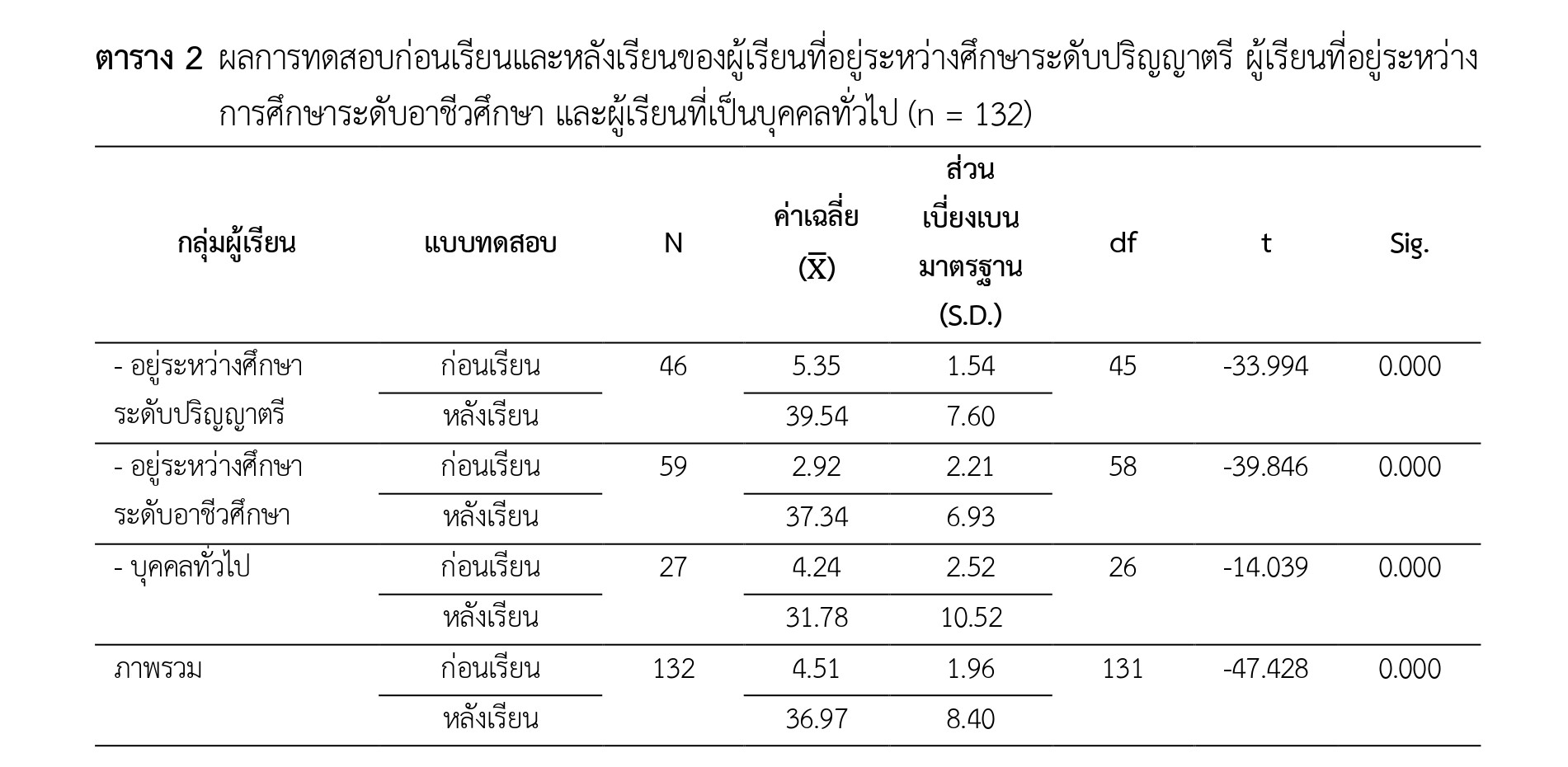Development of Business Ethics and Social Responsibilities Course for Massive Open Online Course
DOI:
https://doi.org/10.14456/psruhss.2024.2Keywords:
Business ethics, Corporate social response, Online learningAbstract
The objectives of this research are to 1) develop business ethics and social responsibilities course on Massive Open Online Course (MOOC) 2) compare learning achievement of students in a pre-post study and 3) evaluate learner satisfaction from 132 students who attended in Prince of Songkla University Massive Open Online Course (PSU-MOOC) during November 2021 and July 2022. The research tool was pre-test, post-test and satisfaction questionnaire. Data analysis was conducted through content review and statistics.
The Business ethics and social responsibility course using ADDIE model approach consisted of 2 chapters, 10 subtopics as follows: Chapter 1- business ethics (1) meaning and importance of business ethics (2) guidelines for decision-making in business ethics (3) business ethics issues (4) factors influencing the level of ethical behavior in an organization (5) process for building ethical standards of the organization. Chapter 2- corporate social responsibility (CSR) with subtopics (6) background and importance of CSR (7) the level of CSR (8) relationship between stakeholders and CSR (9) type of CSR (10) implement CSR project. The results of pre and post-test knowledge of learners were statistically different at the significance level of 0.01. The average was 9.02% and the results of the post-test were 73.94% and 3) the students' satisfaction with the course was at a high level.
References
กชพรรณ นุ่นสังข์, วิภาวรรณ ชอุ่ม เพ็ญสุขสันต์, และสายฝน เอกวรางกูร. (2562). การพัฒนาการจัดการเรียนการสอนออนไลน์แบบเปิดสำหรับมหาชน (MOOC) ในรายวิชาจิตวิทยาพัฒนาการวัยสูงอายุและจิตวิทยาพัฒนาการวัยรุ่น. ใน การประชุมสารสนเทศศาสตร์วิชาการ มหาวิทยาลัยวลัยลักษณ์ ครั้งที่ 8 (น. 1-11). นครศรีธรรมราช: มหาวิทยาลัยวลัยลักษณ์.
กิตติภูมิ มีประดิษฐ์. (2549). จริยธรรมทางธุรกิจ: การพัฒนาคุณภาพจิตที่มีอิทธิพลต่อความประพฤติของมนุษย์ในสังคม. วารสาร INDUSTRIAL TECHNOLOGY REVIEW, 11(151), 154-160.
จันทนา วัฒนกาญจนะ, แพรวพรรณ ตรีชั้น, ธนาธิป พัวพรพงษ์, และวิศิษฐ์ ฤทธิบุญไชย. (2564). ประสิทธิภาพของการเรียนออนไบน์ จากสมรรถนะผู้สอนและการวัดประเมินผล กรณีศึกษาคณะวิทยาการจัดการ มหาวิทยาลัยราชภัฏนครปฐม, วารสารวิชาการสังคมศาสตร์เครือข่ายวิจัยประชาชื่น, 3(2), 1-13.
จิดาภา ธัญญรัตนวานิช. (2562). ภาวะผู้นำและจริยธรรมทางธุรกิจของผู้ประกอบการที่สัมพันธ์กับดำเนินงานของวิสาหกิจขนาดกลางและขนาดย่อมในจังหวัดนนทบุรี. วารสารมนุษยศาสตร์และสังคมศาสตร์ มหาวิทยาลัยราชพฤกษ์, 5(1), 90-103.
ทยากร สุวรรณปักษ์. (2565). จริยธรรมทางธุรกิจและผลการดำเนินงานของวิสาหกิจขนาดกลางและขนาดย่อมในจังหวัดมุกดาหาร. วารสารมนุษยศาสตร์และสังคมศาสตร์, 4(1), 46-66.
บุญชม ศรีสะอาด. (2545). การวิจัยเบื้องต้น (พิมพ์ครั้งที่ 7). กรุงเทพฯ: สุวีริยาสาส์น.
พรประสิทธิ์ เด่นโมฬี, สิริฉันท์ สถิรกุล เตชพาหพงษ์, และอัจฉรา จันทร์ฉาย. (2565). การพัฒนาหลักสูตรผู้ประกอบการ 5.0 สำหรับนักศึกษาผ่านการเรียนการสอนออนไลน์โดยใช้แอดดี้โมเดล. วารสาร มหาวิทยาลัยราชภัฏยะลา, 17(3), 54-63.
พัชรา ตันติประภา, และบัวรัตน์ ศรีนิล. (2553). การสอนจริยธรรมในชั้นเรียนธุรกิจ: มุมมองของนักศึกษาและอาจารย์. วารสารบริหารธุรกิจ, 33(127), 9-34.
วรรณธิดา ยลวิลาส, ปริญญา เรืองทิพย์, และกฤษณะ ชินสาร. (2564). การพัฒนาโปรแกรมการทดสอบแบบปรับเหมาะโดยใช้คอมพิวเตอร์สำหรับการจัดการสอนออนไลน์แบบเปิดกว้างสำหรับมวลชนตามแนวคิดการเรียนรู้ของเครื่องจักร, วารสารสังคมศาสตร์และมานุษยวิทยาเชิงพุทธ, 6(9), 326-337.
ศิลปพร ศรีจั่นเพชน์. (2552). จริยธรรมทางธุรกิจกับบรรษัทภิบาล, วารสารบริหารธุรกิจ, 32(123), 1-6.
ศุภนารี พิรส, และธรรศนวัตร์ ไชยเยชน์. (2565). จริยธรรมทางธุรกิจที่ส่งผลต่อผลการดำเนินงานของผู้ประกอบการธุรกิจขนาดกลางและขนาดย่อมเจเนอเรชันเอกซ์และเจเนอเรชันวายในจังหวัดพิษณุโลก. วารสารวิทยาการจัดการ มหาวิทยาลัยราชภัฏพิบูลสงคราม, 4(1), 1-16.
อรวรรณ แซ่อึ่ง, ประกอบ ใจมั่น, และศิริรัตน์ เพ็ชร์แสงศรี. (2560). รูปแบบการจัดการเรียนรู้ออนไลน์แบบเปิดสำหรับผู้เรียนกลุ่มใหญ่ เพื่อสร้างเสริมสมรรถนะการพัฒนาผลิตภัณฑ์ชุมชน สำหรับบุคลากรวิสาหกิจชุมชน, วารสารสวนสุนันทาวิชาการและวิจัย, 11(1), 90-103.
อาภาพร กลิ่นเทศ. (2565). มู้กส์บทเรียนออนไลน์: การให้ที่ไม่มีสิ้นสุด. วารสาร มจร สังคมศาสตร์ปริทรรศน์, 11(1), 438-452.
Almelhi, A. M. (2021). Effectiveness of the ADDIE Model within an E-Learning Environment in Developing Creative Writing in EFL Students. English Language Teaching, 14(2), 20-36.
Association to Advance Collegiate Schools of Business. (2004). Ethics education in business schools: Report of the ethics education task force to AACSB International’s board of directors. Retrieved September 30, 2022 from https://www.aacsb.edu/-/media/publications/research-reports/ethics-education.pdf?la=en
Chen, W., & Jia, J. (2016). Comparison of online and onsite students’ learning outcomes and experiences in a massively open online course in China. Journal of Educational Technology Development and Exchange (JETDE), 9(1), 5.
Franks, R. A., & Spalding, A. D. (2013). Business ethics as an accreditation requirement: A knowledge mapping approach. Business education & accreditation, 5(1), 17-30.
Gupta, J., & Das, N. (2022). Multidimensional corporate social responsibility disclosure and financial performance: A meta analytical review. Corporate Social Responsibility and Environmental Management. 2022, 1-18.
Ikram, M., Zhou, P., Shah, S. A. A., & Liu, G. Q. (2019). Do environmental management systems help improve corporate sustainable development? Evidence from manufacturing companies in Pakistan. Journal of Cleaner Production, 226, 628–641.
Nuseir, M.T. & Ghandour, A. (2019). Ethical Issues in Modern Business Management. International Journal Procurement Management, 12(5), 592-605.
Peterson, C. (2003). Bringing ADDIE to Life: Instructional Design at Its Best. Journal of Educational Multimedia and Hypermedia, 12(3), 227-241. Norfolk, VA: Association for the Advancement of Computing in Education (AACE). Retrieved September 23, 2022 from https://www.learntechlib.org/primary/p/2074/.
Transparency International. (2021). Corruption Perception Index. Retrieved September 23, 2022 from https://www.transparency.org/en/cpi/2021.

Downloads
Published
How to Cite
Issue
Section
License
Copyright (c) 2024 Humanities and Social Sciences Journal of Pibulsongkram Rajabhat University

This work is licensed under a Creative Commons Attribution-NonCommercial-NoDerivatives 4.0 International License.
Any articles or comments appearing in the Journal of Humanities and Social Sciences, Rajabhat Phibulsongkram University, are the intellectual property of the authors, and do not necessarily reflect the views of the editorial board. Published articles are copyrighted by the Journal of Humanities and Social Sciences, Rajabhat Phibulsongkram University.








